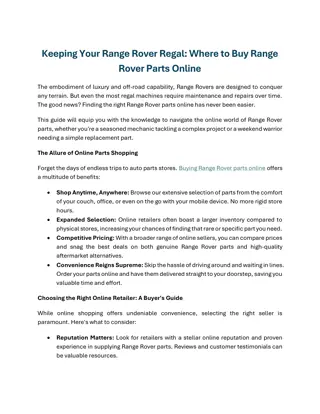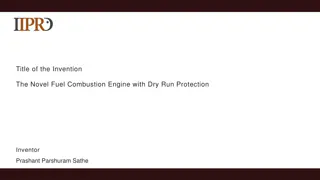Why Is Your Land Rover Overheating Common Causes and How to Fix Them
Overheating in your Land Rover can lead to serious engine damage if not addressed promptly. This guide explores common causes, including coolant leaks, radiator issues, and thermostat failures. Learn effective solutions for diagnosing and fixing over
- land rover maintenance
- land rover
- land rover service center
- land rover overheating
- land rover mechanic
- land rover services
Download Presentation

Please find below an Image/Link to download the presentation.
The content on the website is provided AS IS for your information and personal use only. It may not be sold, licensed, or shared on other websites without obtaining consent from the author. Download presentation by click this link. If you encounter any issues during the download, it is possible that the publisher has removed the file from their server.
E N D
Presentation Transcript
Why Is Your Land Rover Overheating? Common Causes and How to Fix Them
Did you know that Land Rovers are known for their rugged capabilities, but one common issue can stop them in their tracks?
Overheating is a frequent concern that many Land Rover owners face. Overheating in a Land Rover may seem daunting, but it s a manageable issue with the right diagnosis and solutions.
In this script, well explore the main causes of overheating, recognizable symptoms, and effective solutions essential prevention tips, for fixing this problem.
1. Common Causes of Overheating
Faulty Water Pump: The water pump is essential for circulating coolant through the engine. When it fails, coolant flow decreases, causing the engine to overheat quickly.
Clogged Radiator: Over time, radiators can become clogged with debris or rust, reducing their cooling efficiency and leading to increased engine temperatures.
Thermostat Issues: A faulty thermostat that sticks closed prevents coolant from flowing through the engine, disrupting the cooling system and causing rapid overheating.
Head Gasket Failure: A blown head gasket allows coolant and oil to mix, causing severe overheating and potentially major engine damage.
Low Coolant Levels: Coolant absorbs heat from the engine; without sufficient coolant, the engine cannot cool properly, leading to overheating.
2. Symptoms of Overheating
Temperature Gauge: The temperature gauge on your dashboard provides a clear indication of engine temperature. If it s higher than normal or in the red zone, overheating may be imminent.
Steam from Hood: Steam coming from under the hood is a visible sign that the engine is overheating, likely due to coolant escaping or boiling.
Strange Noises: Overheating can cause unusual sounds, such as hissing from coolant leaks or knocking due to engine stress.
Reduced Performance: When overheating occurs, the engine may lose power or run less efficiently, affecting acceleration and overall performance.
Regular Maintenance Avoid Quality Coolant Overheating
Professional Diagnosis: Overheating can have multiple causes, so it s wise to consult a professional mechanic who can accurately diagnose the issue.
Water Pump Replacement: If the water pump is faulty, replacing it will restore coolant flow and prevent further overheating.
Radiator Cleaning or Replacement: Cleaning or replacing a clogged radiator allows for efficient cooling and reduces the risk of overheating.
Head Gasket Repair: Repairing a blown head gasket is a complex task that requires professional expertise to prevent major engine damage.
Coolant Level Check: Regularly check and maintain coolant levels to ensure optimal cooling system performance.
Addressing Land Rover overheating issues involves understanding common causes, recognizing symptoms, and implementing preventive maintenance and effective repairs.
Protect your Land Rovers performance by taking proactive steps to prevent overheating and seeking professional help when needed.
https://oriona2.com/ THANK YOU























